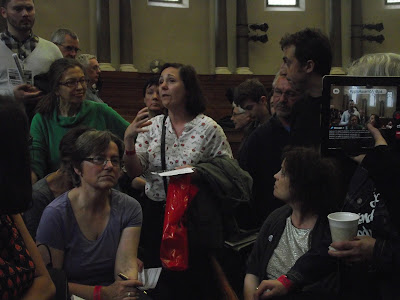There were a great many police around, who seemed to have nothing to do except hang about, bored and trying to look macho. I don't know how they can afford it in an age of austerity. One person was arrested outside after a confrontation with some EDL people, who weren't arrested. I don't know what happened, but I got some shots of the confrontation with police which followed.
Some of the gloomy prognostications I've heard about it turning into a top-down event where we sat and listened to speeches were wrong. Two out of the three sessions I attended broke down into small groups, and even the one which didn't had a string of speakers. Obviously, it takes time to build a democratic movement, and we can't expect a baby to walk, talk and use the toilet the moment it comes out of the womb. The Assembly needs to be judged by what comes out of it, and how strong, and how democratic that is.
There's a good article here, with some points to bear in mind. We have to ensure democracy, and then there are problems with Labour and the unions. Maybe Labour can be pushed to the left, maybe it can't. If it can't, how do we respond to that? It's one thing for a union leader to stand up in a meeting and talk about bringing the country to a halt, but nobody's tried to do it since Arthur Scargill and the Miners' Strike. Unions give the Left a great deal of support, financial and otherwise, but how do they respond to all the anti-union legislation that's now in place? Is it still possible for organised labour to make more than a token strike, or do we need to find other forms of resistance? A one-day general strike, for instance, would change nothing, but what about a day a week?
To some extent, the Assembly's still stuck in the old model of a bunch of activists getting together and making decisions without involving the people out there on the street. The danger is, of course, of losing touch with reality, like the people I knew who seemed to spend their lives fantasising about mass popular movements which simply didn't exist. At least we're starting to get away from sectarianism, with all the groups round the country learning how to work together. I still get asked how people can disagree with each other can work together; I come across the same question in a church context as well. It's just a fact of life; people don't always agree about everything, and if that stops us working together, then we won't deserve to get anywhere. If we continue the way we're going, then in time we may get to a point where we don't have to have different organisations fighting, say, the Bedroom Tax, but a single network under a single banner. If nothing else, it would be easier for everyone to relate to.
Then there's the question of how to get a wider group of people involved in the fight. This is crucial; without a mass movement, we're unlikely to get very far. It may come, or it may not, but we can only start where we are. The country's had no real opposition for a generation, so people have no idea, for instance, that there are alternatives to austerity. We need to start convincing people that there is an alternative, that the politicians and the media are lying to us. Then we'll see how they react. They already feel alienated, exploited, lied to. Councils round the country are reporting that a third to a half of people liable for the Bedroom Tax are paying nothing, and many more are only paying part. These figures are liable to rise as resources run out, and the winter cold begins to bite. Obviously, it's happening through simple inability to pay, but we have what amounts to a massive rent strike going on, right across the country. In the coming months, we'll see how able the political system is to handle that. If the tax goes, then people may begin to realise their strength. I go out and talk to people, and they'll willingly tell me how much they hate the Bedroom Tax. Getting them to come out and join a movement is a problem, but part of that may be that they've never seen a mass political movement, and don't know what it can achieve. We just don't know, and it's no good trying to second-guess the future.
There's a link here to a statement which was agreed - as far as I could see unanimously - at the Assembly. There was no opportunity to amend it on the day, and it might have led to chaos if there had been. However, there's nothing to stop a future Assembly from doing so. I think we should treat it as something up for discussion, not something set in stone.
Like all things we do, the Assembly wasn't perfect, but I felt it was a good start. We need to keep going, build local Assemblies, and try to widen the conversation. I hope the critics will get involved, and try to make it better!






